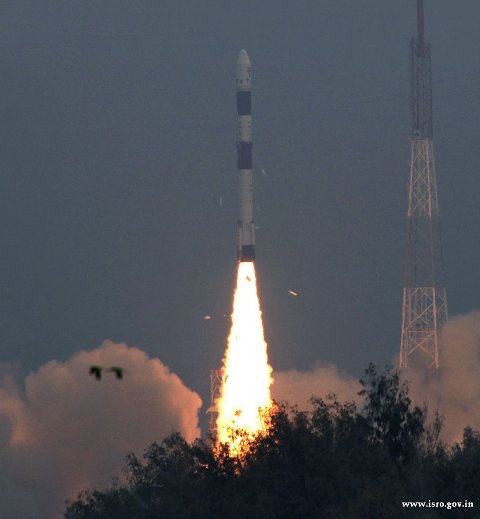Science News Roundup: Scientists create "mini placenta" organoids; India fires 31 satellites into space; Amazon's self-driving toy car for coders

Following is a summary of current science news briefs.
Genome editing summit organizers condemn Chinese scientist's gene-editing baby claims
The organizers of a conference where a Chinese scientist claimed to have edited the genes of twin babies condemned the work on Thursday, calling it "deeply disturbing" and "irresponsible". "Even if the modifications are verified, the procedure was irresponsible and failed to conform with international norms," the organizing committee of the Second International Summit on Human Genome Editing, being held in Hong Kong this week, said in a statement released by email and posted online.
New ultralight material offers many uses for plastic waste, researchers say
Researchers in Singapore are seeking a patent for a new sound-proof and heat-resistant material made from recycled plastic bottles they say could help reduce plastic waste dumped in oceans and clogging landfills. The National University of Singapore team said it had found a way to convert bottles made from polyethylene terephthalate (PET) into aerogels that have many potential uses - from insulation and fire safety to cleaning up oil spills.
Amazon's latest gadget: a self-driving toy car for coders
Self-driving cars, meet Amazon's self-driving toys. Amazon.com Inc's cloud unit on Wednesday announced a $399 autonomous toy car, aimed at helping web developers try out some of their own self-driving technology. Customers can train and tweak machine learning models in an online simulator and then test drive them on vehicles one-eighteenth the size of a real race car.
Ancient toothless whale was forerunner of modern cetacean giants
A prehistoric 15-foot-long (4.5 meters) whale that sucked prey into its mouth represents a key missing puzzle piece concerning the evolution of today's huge filter-feeding whales, scientists said on Thursday. The researchers described fossils unearthed in Oregon of a whale named Maiabalaena nesbittae that lived 33 million years ago and possessed neither teeth nor baleen, the material that modern filter-feeding whales use to strain large amounts of tiny prey out of the water for food.
India's Earth observation satellite among 31 sent into space
India fired a rocket carrying 31 satellites into space on Thursday, including its own advanced earth observation satellite among the other smaller ones launched for eight countries. The rocket launched from the southern state of Andhra Pradesh carried the Hyper-Spectral Imaging Satellite (HysIS) with high resolution, digital-imaging equipment to map the earth, the Indian Space Research Organisation (ISRO) said.
NASA selects nine U.S. companies to vie for moon program funding
NASA on Thursday named nine U.S. companies, including Lockheed Martin Corp, that will compete for funding under the space agency's renewed long-term moon program, a private-public undertaking to develop technology that will explore the lunar surface. The companies, some which will develop small launch vehicles and robotic rovers over the next 10 years, will vie for a chunk of the $2.6 billion under the National Aeronautics and Space Administration's Commercial Lunar Payload Services program.
Furhat, a robot with the human touch, wants to hear your woes
Furhat tilts his or her head, smiles, exudes empathy and warmth, and encourages us to open up. The robot, a three-dimensional bust with a projection of a human-like face, aims to build on our new-found ease talking to voice assistants like Siri and Alexa, by persuading us to interact with it as if it were a person, picking up on our cues to strike up a rapport.
Scientists create "mini placenta" organoids in a lab dish
Scientists in Britain have succeeded in creating mini human placenta organoids which they say will transform scientific understanding of reproductive disorders such as pre-eclampsia and miscarriage. The organoids - miniature functional cellular models of the human placenta's earliest stages - will also allow researchers to explore what makes a pregnancy healthy, and how certain diseases can pass from a mother to a developing baby.
Chinese geneticist reveals another "potential" gene-edited pregnancy
A Chinese scientist at the center of an ethical storm over what he claims are the world's first genetically edited babies said on Wednesday he is proud of his work and revealed there was a second "potential" pregnancy as part of the research. He Jiankui, an associate professor at Southern University of Science and Technology in Shenzhen, China, addressed a packed hall of around 700 people attending the Human Genome Editing Summit at the University of Hong Kong.
(With inputs from Reuters)
(With inputs from agencies.)
- READ MORE ON:
- Editing
- Genome editing
- DNA
- Chinese language
- Geneticist
- Company
- Production company
- Startup company
- Research
- Qualitative research
- Randomness
- Scientist
- The Scientist
- We Are Scientists
- Potential
- Action potential
- Bone fracture
- Second International
- Summit International School
- Summit International Preparatory
ALSO READ
Struggling to Safeguard Infant Corals from Predatory Fish: Scientists' Challenge
IISc researchers design sustainable hydrogel to remove microplastics from water
Researchers find ways to prevent idiopathic pulmonary fibrosis
Flowers may be more ancient than dinosaurs – but scientists can’t agree on when they evolved
Researchers discover brain region involved in control of attention










